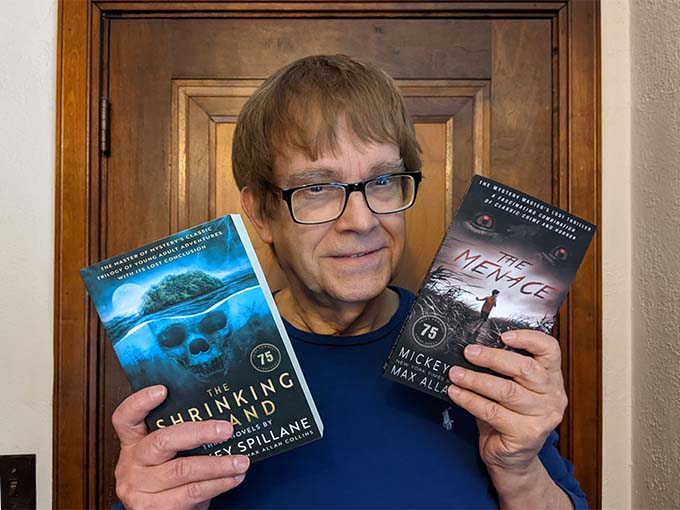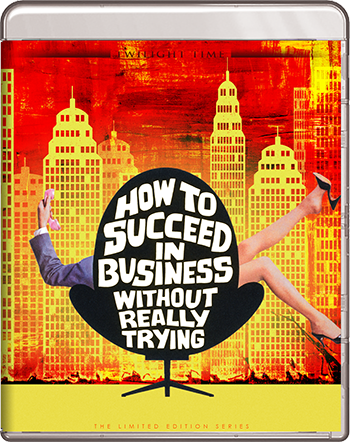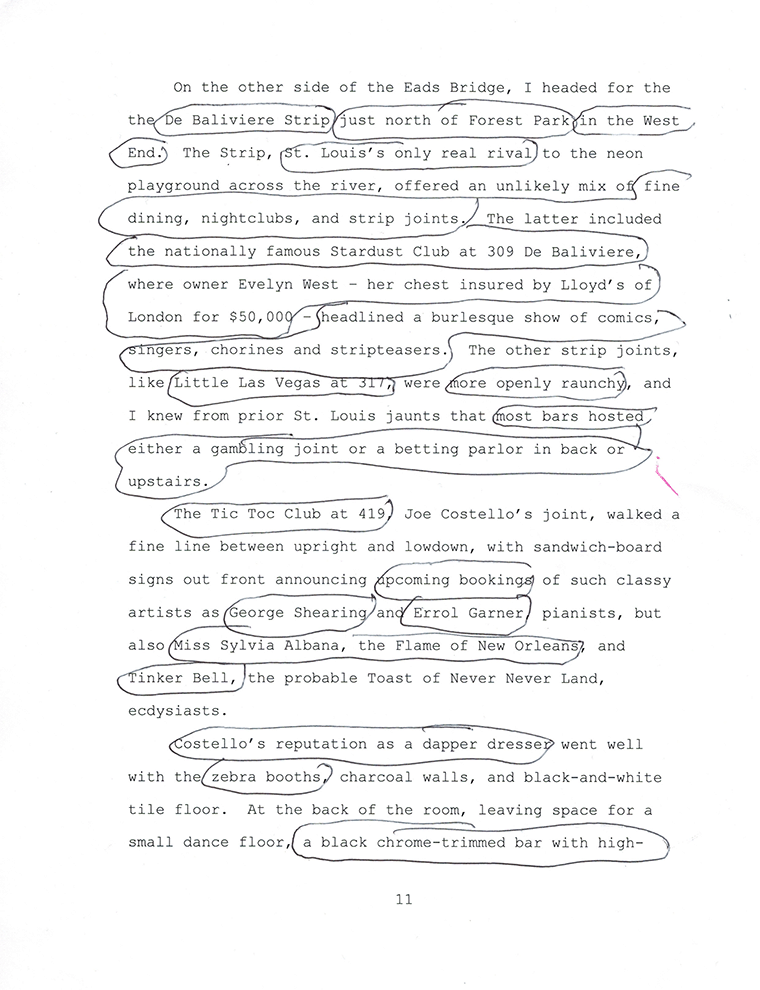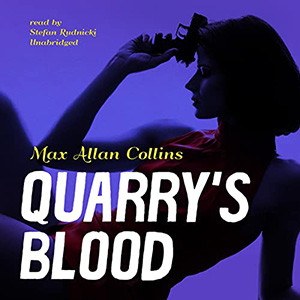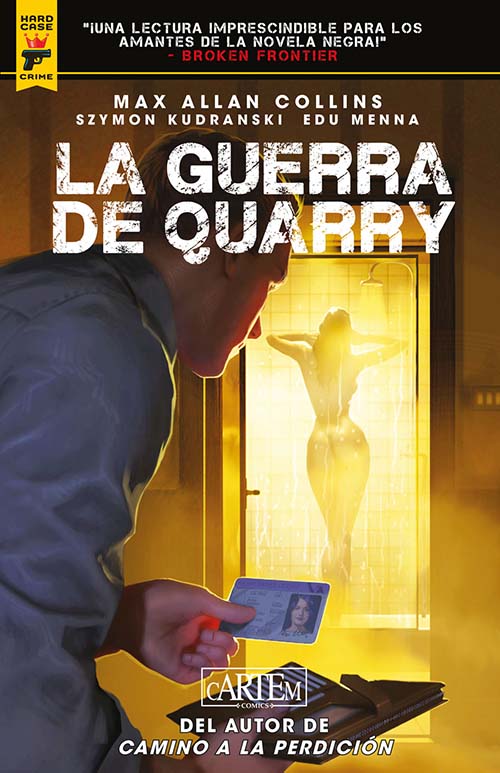In case you haven’t been listening, 2022 is the 75th anniversary of Mike Hammer’s debut in the 1947 novel I, the Jury. A lot of exciting things are already underway. So far we’ve got The Shrinking Island and The Menace out there from Wolfpack’s imprint, Rough Edges Press. And coming up in about two weeks from Rough Edges is a great anthology of Spillane novellas, Stand Up and Die!
But perhaps most exciting of all (next to the January 2023 prose biography, Spillane – King of Pulp Fiction by Jim Traylor and me from Mysterious Press) is the long, long-awaited release of the 1953 film version of I, the Jury…and in 3-D!
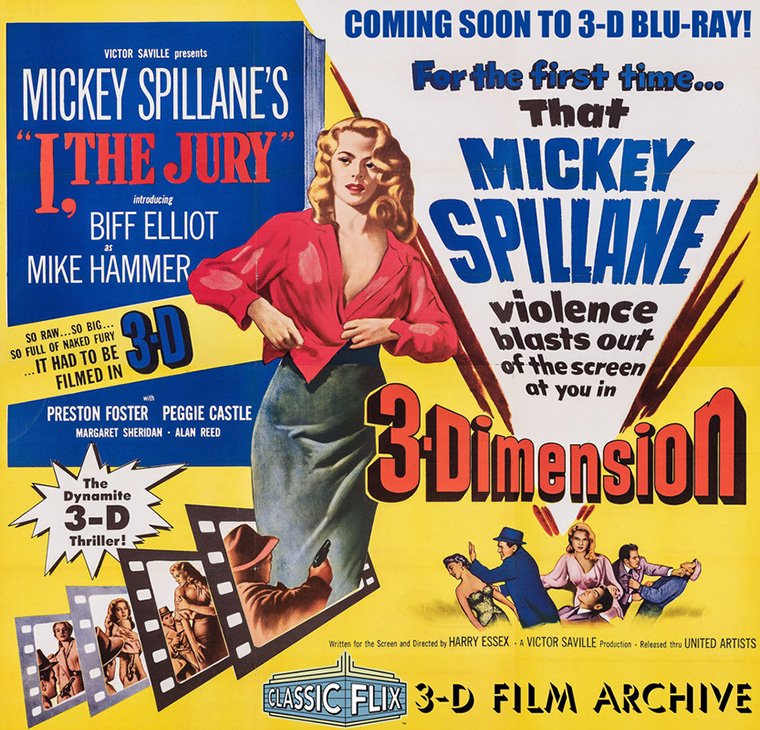
ClassicFlix – who specialize in (not surprisingly) Blu-rays and DVDs of classic films from Hollywood’s 1930s/’40s/’50s Golden Age – is bringing it out (likely in the fall).
I will be doing the commentary.
The 1953 I, the Jury is a very underrated film (including by Mickey). Biff Elliot makes a fine Mike Hammer and the script and direction by Harry Essex are faithful to the source. Peggie Castle and Margaret Sheridan make the definitive Spillane women, and the great noir specialist, cinematographer John Alton, works in 3-D with his usual artistry. I put only Kiss Me Deadly ahead of it and would call the first I, the Jury a tie with The Girl Hunters for second place.
The publishing schedule for the Hammer anniversary includes The Menace, with me writing a horror/crime novel from an unproduced Spillane screenplay; a collection of the three YA novels, The Shrinking Island, with the previously unpublished title tale a Spillane fan Holy Grail; and the soon-to-be-published Stand Up and Die! (with a Spillane/Collins Hammer story) the best collection of Mickey’s novellas ever assembled.
In August Titan will bring out the novel Kill Me If You Can, again with me working from an unproduced Spillane screenplay and dealing with the period between Kiss Me, Deadly and The Girl Hunters – the direct aftermath of Velda’s disappearance. The book includes five Spillane/Collins short stories, including two Hammers.
And the capper of this wave of Spillane publishing will be the 100,000-word bio from Jim Traylor and me.
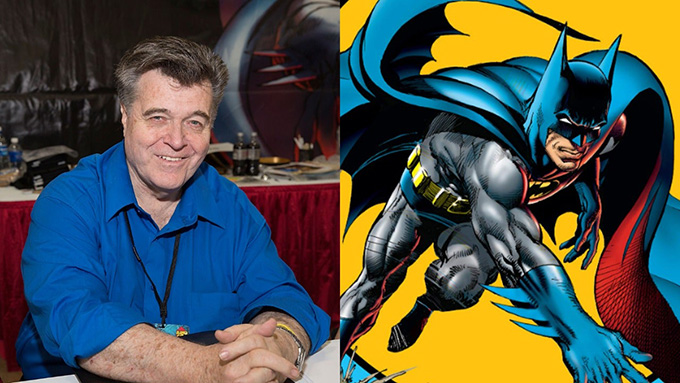
Two legends: Neal Adams (left), Batman (right)
I suppose being my age – 74, damnit – means a progressive thinning of the ranks of my heroes and friends (two groups not mutually exclusive). Now we have lost Neal Adams, at 80, who for my money is the best Batman artist of the “serious” period, which – let’s face it – he and Denny O’Neil (also gone) invented.
He did much more, of course. His work on the comic strip Ben Casey, in his very early twenties, is stellar – I have an original daily example on my wall. I loved his Deadman, the Green Arrow/Green Lantern work was groundbreaking, and, really, everything his pen touched turned to great.
But he also was a champion for the rights of his fellow cartoonists, and he was a big part of getting some recompense for Joe Shuster and Jerry Siegel, the teenagers from Cleveland on whose bones the DC empire was built.
I knew him a little, and I was complimented that he knew who I was…something which still seems to me a little unbelievable. I have a small but cherished memory of standing in line with him getting ready to ship things home from the San Diego Comic Con. I introduced him to my wife as a beginner I knew, and his grin couldn’t have been wider. He had a smile as dazzling as his artwork, and that’s plenty dazzling. We chatted and laughed for about five minutes, a small encounter that I will never forget. I always stopped by his booth at the con in subsequent years just to say hi.
Not a big relationship, by any means. But a big loss.
Another sign of advancing old age is my reading habits. I’ve never been one to start a book and then put it down without finishing it. But now I won’t waste my time if a book doesn’t engage me in a chapter or so. Like most of you, I have an ever-growing stack (stacks) of books I can’t wait to read. So some of this stuff just has to get out of the way if it can’t grab me.
Related to this is my experience with Judd Apatow’s new book, Sicker in the Head, a follow-up (of course) to his Sick in the Head. Both books are Apatow interviewing individuals in the world of comedy. I read every page of the first book. This time I read about a third of it.
Not the first third – I selected interviewees I was interested in – like the late John Candy, John Cleese, David Letterman, Peter Davidson, John Mulaney, Kevin Hart, Sasha Baron Cohen, Samantha Bee, and Will Ferrell. But I have no interest in people I have barely (or not at all) heard of – for example, Amber Ruffin, Ed Templeton, Hannah Gadsby, Lulu Wang, and on and on. Please don’t write telling me who they are, and/or defending their presence in a book with the comic legend likes of Candy and Cleese. I just don’t have time to let these people in unless they get up on their hind legs in the pop culture and make enough noise for someone my age to notice.
Now a book I read every word of is the massive, inch-and-a-half thick, 8.5″ by 11″, 772-page (!) Marketing Martin and Lewis by Richard S. Greene…with a foreword by Eddie Deezen! (Why didn’t Apatow interview him?!?). This is a Martin and Lewis fan’s dream, and worth the fifty-buck price tag (although I got it through Barnes & Noble for $40 using a coupon).
The book is predominantly pictures – movie posters and ads, TV ads, magazine covers, publicity photos, comic book art (Neal Adams!), and on and on; but the text is substantial and thorough, with every Martin & Lewis film discussed and the individual, post-team careers of both are examined. Greene is the ideal fan – his knowledge and the collectibles he shares are mind-bogglingly vast, but his opinions are frank, fair and well-articulated.
It also has the greatest cover of any book ever published. I shared this opinion with my wife, who looked at me as if about to say, “Are you for real?”
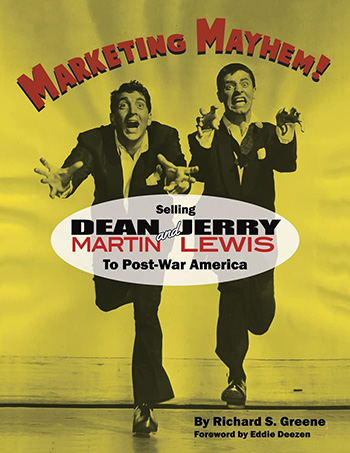
Here’s a New Yorker article about a Muscatine, Iowa (my hometown) resident who inspired my Mallory novel, No Cure for Death.
An interesting Road to Perdition article is here, looking at the film’s shooting locations (cameras, not guns).
Netflix has added Road to Perdition to its roster.
This review of the Nolan two-fer, Double Down, begins with a left-handed compliment but evolves into a pretty decent write-up. I wrote these books around 1974 and it’s peculiar to see them judged in terms that don’t acknowledge it’s not unusual for writers to grow over time.
Finally, this article wonders whether Road to Perdition is based on a true story (the answer is “sort of”).
M.A.C.
